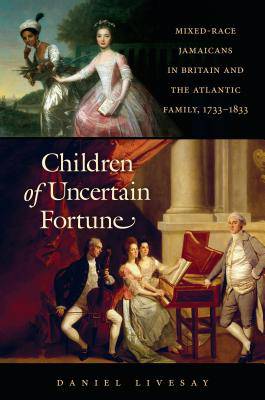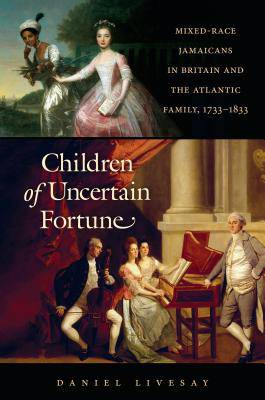
- Afhalen na 1 uur in een winkel met voorraad
- Gratis thuislevering in België vanaf € 30
- Ruim aanbod met 7 miljoen producten
- Afhalen na 1 uur in een winkel met voorraad
- Gratis thuislevering in België vanaf € 30
- Ruim aanbod met 7 miljoen producten
Zoeken
Children of Uncertain Fortune
Mixed-Race Jamaicans in Britain and the Atlantic Family, 1733-1833
Daniel Livesay
€ 72,95
+ 145 punten
Omschrijving
By tracing the largely forgotten eighteenth-century migration of elite mixed-race individuals from Jamaica to Great Britain, Children of Uncertain Fortune reinterprets the evolution of British racial ideologies as a matter of negotiating family membership. Using wills, legal petitions, family correspondences, and inheritance lawsuits, Daniel Livesay is the first scholar to follow the hundreds of children born to white planters and Caribbean women of color who crossed the ocean for educational opportunities, professional apprenticeships, marriage prospects, or refuge from colonial prejudices.
The presence of these elite children of color in Britain pushed popular opinion in the British Atlantic world toward narrower conceptions of race and kinship. Members of Parliament, colonial assemblymen, merchant kings, and cultural arbiters -- the very people who decided Britain's colonial policies, debated abolition, passed marital laws, and arbitrated inheritance disputes -- rubbed shoulders with these mixed-race Caribbean migrants in parlors and sitting rooms. Upper-class Britons also resented colonial transplants and coveted their inheritances; family intimacy gave way to racial exclusion. By the early nineteenth century, relatives had become strangers.
The presence of these elite children of color in Britain pushed popular opinion in the British Atlantic world toward narrower conceptions of race and kinship. Members of Parliament, colonial assemblymen, merchant kings, and cultural arbiters -- the very people who decided Britain's colonial policies, debated abolition, passed marital laws, and arbitrated inheritance disputes -- rubbed shoulders with these mixed-race Caribbean migrants in parlors and sitting rooms. Upper-class Britons also resented colonial transplants and coveted their inheritances; family intimacy gave way to racial exclusion. By the early nineteenth century, relatives had become strangers.
Specificaties
Betrokkenen
- Auteur(s):
- Uitgeverij:
Inhoud
- Aantal bladzijden:
- 432
- Taal:
- Engels
- Reeks:
Eigenschappen
- Productcode (EAN):
- 9781469634432
- Verschijningsdatum:
- 22/01/2018
- Uitvoering:
- Hardcover
- Formaat:
- Genaaid
- Afmetingen:
- 213 mm x 237 mm
- Gewicht:
- 766 g

Alleen bij Standaard Boekhandel
+ 145 punten op je klantenkaart van Standaard Boekhandel
Beoordelingen
We publiceren alleen reviews die voldoen aan de voorwaarden voor reviews. Bekijk onze voorwaarden voor reviews.











